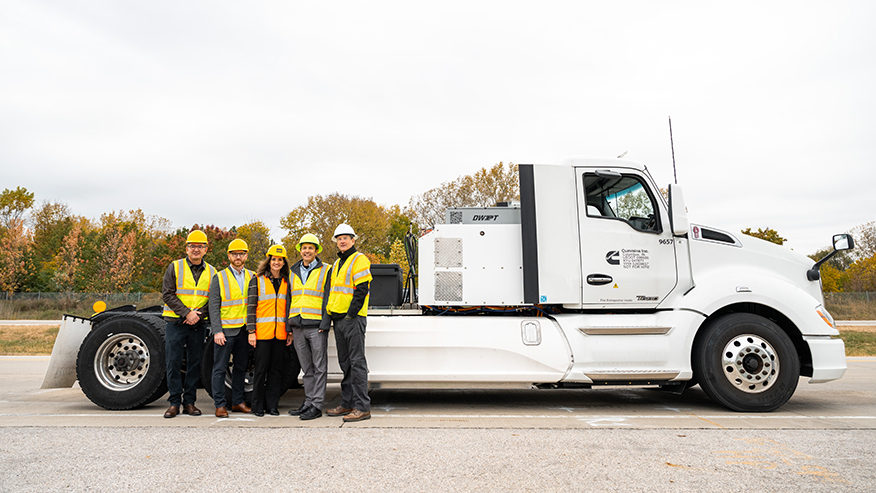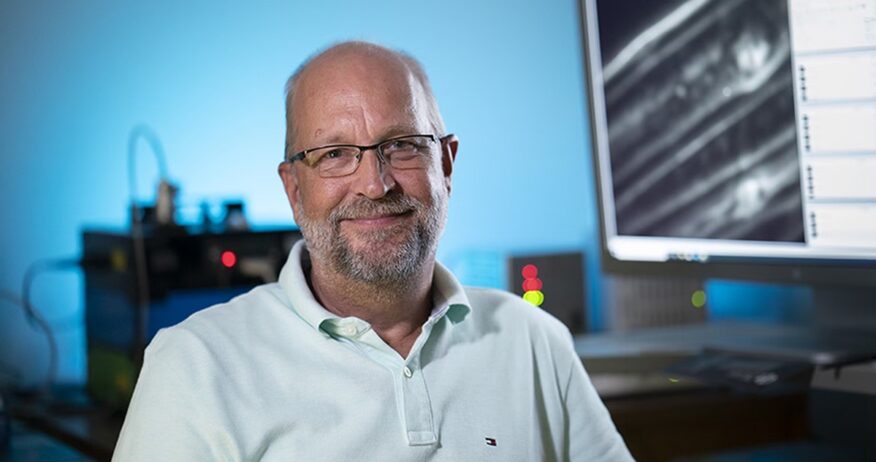Purdue-Ireland relationship fosters research and study abroad opportunities in pharmaceutical manufacturing
Close ties also bolster workforce development efforts

Alyssa Wilcox (second from left), Purdue senior vice president for partnerships; Dr. Jerome Adams, executive director of Purdue’s Health Equity Initiatives; and Eric Barker, the Jeannie and Jim Chaney Dean of Pharmacy, were part of a group that toured the National Institute for Bioprocessing Research and Training in Dublin, Ireland. (Photo courtesy of the Royal College of Surgeons in Ireland)
WEST LAFAYETTE, Ind. —
Purdue University and leading academic and research universities in Ireland continue to build upon existing partnerships to bolster additional collaborative research efforts and study abroad opportunities.
Purdue was one of several U.S. universities invited to attend the American Irish Medical Summit in Dublin in August. Hosted by the Royal College of Surgeons in Ireland, AIMS is a collaboration of academic, government and industry leaders focused on the development and adoption of emerging health technologies, research and academic partnerships, and workforce leadership development.
“In its entirety, our trip represented a powerful trifecta of conversations between industry, academia and government,” said Alyssa Wilcox, senior vice president for partnerships and the Purdue president’s chief of staff. “We have been cultivating these relationships with our Irish partners for decades. This particular visit was pivotal as we create pathways toward innovative technologies and research efforts that are mutually beneficial.”
Additional Information
- Purdue hosts Irish delegation for Education and Policy Supporting Digital Health Equity conference
- Topp named to lead institute for advanced pharmaceutical manufacturing at Purdue
- Dublin Institute of Technology, Purdue expand partnership
- NIBRT announces appointment of Purdue’s Elizabeth Topp as chief scientific officer
“There are significant parallels between both the state of Indiana and the country of Ireland in terms of scholarly research in the life sciences sector,” said Eric Barker, the Jeannie and Jim Chaney Dean of Pharmacy and a professor of medicinal chemistry and molecular pharmacology. “Purdue is the perfect conduit for these partners to continue collaboration on innovative research, pharmaceutical discovery, and manufacturing and technology commercialization.”
Barker, who presented at the conference, said both Ireland and Indiana share a strong commitment to move discoveries that occur in research labs into the marketplace and improve patients’ lives. There is also a critical workforce development element to the relationship.
“Working together, learning from each other and developing collaborative relationships with faculty will help strengthen the Indiana pharma manufacturing sector and provide students and the industry with new training resources to support this fast-growing field,” Barker added.
In March, Purdue signed a five-year memorandum of understanding with the Ireland-based National Institute for Bioprocessing Research and Training, an international leader in biopharmaceutical manufacturing research and development and training. NIBRT partners with industry and academia to support international best practices in all aspects of biologics manufacturing training and research.
A key element of the agreement is to use the NIBRT business model to attract the best pharmaceutical experts to Indiana and train and retain them.

“There are continuing workforce needs around health care. It’s really a global problem, not just an Irish or American problem,” said former U.S. Surgeon General Dr. Jerome Adams, who joined Purdue in October 2021 as executive director of Purdue’s Health Equity Initiatives.
Adams, who spoke at the conference, is also a Distinguished Professor of Practice in the departments of Pharmacy Practice and Public Health. Adams said through immersive international experiences, Purdue students can better understand global issues and prepare themselves for leadership roles.
“Through partnerships, such as with NIBRT, Purdue is playing a pivotal role to help produce the workforce of the future in advanced pharmaceutical development and manufacturing,” he said. “If we can send students to train cross-culturally, they’ll be better prepared for this new global workforce and global economy.”
Purdue and NIBRT already enjoy a close relationship. In June, Elizabeth Topp, professor in the Department of Industrial and Physical Pharmacy and the Davidson School of Chemical Engineering, was named the inaugural director of the William D. and Sherry L. Young Advanced Manufacturing of Pharmaceuticals Institute.
She previously served as chief science officer for NIBRT. As part of Purdue’s ongoing partnership with NIBRT, Topp will continue to hold a joint research appointment with the institute.
Adams said while much of the focus was on biopharma, the summit allowed Purdue to showcase to international institutions other areas of excellence at the university that play a critical role in health.
“Our College of Pharmacy, our School of Nursing, our Department of Public Health, our veterinary school, our College of Agriculture — all of these different assets that we have at Purdue are helping us to be global leaders in the broader aspects of health,” Adams said. “There is now growing recognition that all of those fields play a vital role in health, beyond a hospital or traditional doctor.”
Barker said expanding the Purdue-Ireland relationship corresponds with the LEAP Innovation District in Lebanon, which is under development along Indiana’s Interstate 65 Hard Tech Corridor.
Indianapolis-based Eli Lilly and Company, which is a major player in Ireland’s pharmaceutical industry, has committed to build an R&D and manufacturing campus in the LEAP district.
“We continue to think about ways that we can contribute not only to new workforce talent development but also to retraining and upskilling of existing workforce to shift from traditional pharmaceutical manufacturing into more advanced pharmaceutical manufacturing — and finding opportunities to contribute to the training elements there as well,” Barker said. “Our partnership will help Purdue play a critical role in training the thousands of jobs coming to the industry.”
This work is part of Purdue’s One Health initiative.
About Purdue University
Purdue University is a public research institution with excellence at scale. Ranked among top 10 public universities and with two colleges in the top 4 in the United States, Purdue discovers and disseminates knowledge with a quality and at a scale second to none. More than 105,000 students study at Purdue across modalities and locations, with 50,000 in person on the West Lafayette campus. Committed to affordability and accessibility, Purdue’s main campus has frozen tuition 12 years in a row. See how Purdue never stops in the persistent pursuit of the next giant leap, including its first comprehensive urban campus in Indianapolis, the new Mitchell E. Daniels, Jr. School of Business, and Purdue Computes, at https://www.purdue.edu/president/strategic-initiatives.
Writer/Media contact: Wes Mills, wemills@purdue.edu
Sources: Eric Barker, Jerome Adams



